Gaius Fulvius Plautianus
Gaius Fulvius Plautianus (†205): praetorian prefect of the Roman emperor Septimius Severus.
Early Career
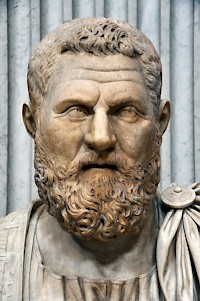
Although Plautianus was one of the most powerful Roman officials ever, we know next to nothing about the beginning of his career. Yet, we are certain that he was born in Lepcis Magna as a member of one of the leading families, the Fulvii. It is very plausible that as a boy or young man, he knew Septimius Severus, who was to become emperor. The historian Herodian even knew a tradition that they were relatives, and it is intriguing that Septimius' mother was a Fulvia.note
Plautianus' year of birth is not recorded, but the bust in the Vatican Museums, made in the first years of the third century, shows a man of about fifty, sixty years old. This suggests that he was born between 140 and 150, which makes him about the same age as Severus.
Herodian also records a tradition that Plautianus "was banished after being convicted of treason and many other crimes". This is perhaps confirmed by Cassius Dio, who mentions "a man" who was condemned by the governor of Africa, the future emperor Pertinax.note He may be identical to Plautianus, because in the margin of the manuscript, the medieval corrector identified the man as one "Phloubios". If Plautianus was indeed sent into exile by Pertinax, it must have happened when he was governor: in 188.
The inscription known as IRT 572, erected by a Fulvia Nepotilla for a brother whose name has been erased, probably refers to the early stages of Plautianus' career. It mentions two positions: procurator XX hereditatium and praefectus vehiculorum. The first of these meant that Plautianus had to collect the 5% inheritance tax, the second meant that he was in charge of the roads and the courier service (cursus publicus). This was a normal equestrian career.
At some stage, early in his career, Plautianus must have married. We do not know his wife's name, but she may have been called Hortensia. This can, at least, be deduced from the fact that the couple had a son named Gaius Fulvius Plautianus Hortensianus. A Hortensius family is not known from Lepcis, which suggests that Plautianus had a larger network. (This was not uncommon: Septimius Severus married to Julia Domna, a lady from Syria.) Hortensia and Plautianus also had a daughter, born in c.187, Plautilla.
Severus' Coup
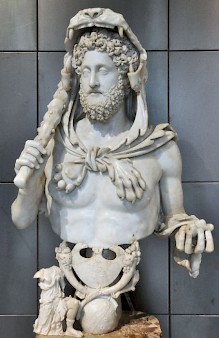
In those years, the Roman Empire was ruled by Commodus. History has not been kind towards this emperor, who found it difficult to cooperate with the Senate, and found himself increasingly isolated. When the city suffered from a great fire in 192, and Commodus had no other policy than to present himself as "Roman Hercules" and fight as a gladiator in the Colosseum, he rapidly lost what had remained of his credit, especially when he threatened to kill the consuls. On 31 December, he was assassinated and replaced by Pertinax, who had not expected this.
At least, that is the official interpretation of the events, but an analysis of imperial appointments in 191 and 192 tells a different story. A new praetorian prefect, Laetus, appears to have been able to appoint his political friends on key positions, and nearly all of them were from Africa. One of the new men was Lucius Septimius Severus, who was made governor of Pannonia, where he commanded the three legions closest to Italy. His brother Publius Septimius Geta was made governor in Lower Moesia; Pertinax -former governor of Africa- was made praefectus urbi. In other provinces with garrisons, like Syria, mediocre men were made governor, like Pescennius Niger in Syria. His army would not intervene if Commodus were killed.
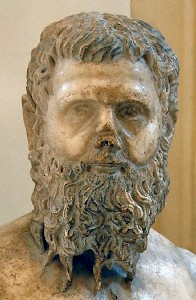
In this way, everything was prepared for the final coup, which ought to bring Pertinax to the throne. Everything went according to plan, and on 1 January 193, his reign began. The fact that the legions of Pannonia and Moesia immediately recognized him and the fact that other armies were commanded by poor soldiers, prevented a civil war.
Yet, the atmosphere was tense because the soldiers of the Praetorian Guard received only half of the 12,000 sesterces they had been promised. Most men must have understood that the second installment would be paid later, but some rioters decided to put some pressure on the emperor, and burst into the palace. On 28 March 193, eighty-six days after the death of Commodus, Pertinax was killed, more or less by accident.
When this news was reported to the armies in Pannonia and Moesia, Septimius Severus had himself proclaimed emperor. It was, after all, what he had been expected to do if anything went wrong. He immediately marched on Rome, and dethroned Didius Julianus, who had been appointed as paymaster-emperor by the Praetorians. His only recordable act is that he had Laetus assassinated.
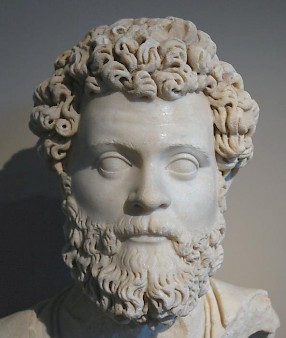
We would like to know where Plautianus was in these years, and it may be that he was praefectus vigilum: commander of the watchmen of the city. Unfortunately, we do not know who appointed him. It may have been Commodus, which means that Plautianus was in fact appointed by Laetus and was part of the conspiracy. This, however, is not likely. Alternatively, it may be that he was appointed by Pertinax, as Dio seems to suggest,note or even by Severus.
In any case, it is certain that Plautianus made himself useful to Severus by searching for the children of Pescennius Niger, who had in the meantime proclaimed himself emperor in Syria.note The children of his ally Asellius Aemilianus were also rounded up.note
In the second half of 193, Severus attacked Niger, who was defeated in the spring of 194. Plautianus took part in this campaign, and was also present when Severus invaded the Parthian Empire, which had supported Niger. In 196, we find both Severus and Plautianus back in Rome, preparing for war against Clodius Albinus, a fellow-African who had acted as Severus' caesar or intended successor. (The new caesar was Severus' son Caracalla, a mere boy.)
Before 1 January 197, Plautianus was made praetorian prefect, which meant that he was not only in charge of the Praetorian Guard, but also of a new legion, II Parthica. He must have taken part in the decisive battle against Albinus, near Lyon, on 19 February 197. An inscription records that he now held the title of clarissimus vir, which was only given to senators and not to equestrians.note It proves that the emperor really appreciated him. It is likely that he also wore the ornamenta consularia, the consular robe. Everyone must have known that the second man in the Empire was not the young caesar, but Plautianus.
Increasing Power
Next winter, Severus and Plautianus were again in Mesopotamia, fighting against the Parthians. After the Parthian capital Ctesiphon had been sacked, Caracalla was officially made co-ruler, with the rank of Augustus. As he was only ten years old, the real power continued to be with his father and the praetorian prefect, who continued to amass honorific positions: augur (seer) and pontifex (priest). During this campaign, he was not only commanding the Guard and II Parthica, but also rounding up supporters of Pescennius Niger. The property of his victims was added to his fortune.note
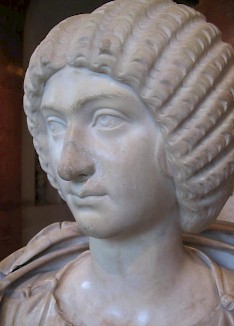
The Historia Augusta mentions that Severus was even forced to execute some his closest friends,note which suggests that Plautianus used his powers to get rid of potential rivals. Indeed, it seems that in these years, the careers of men like Avitus Alexianus and Varius Marcellus, relatives of Severus' wife Julia Domna, came to standstill.
Severus realized that Plautianus was becoming dangerously powerful, but when he tried to promote the praefectus Aegypti, Aemilius Saturninus, to the praetorian prefecture, giving his right-hand man a colleague, the newcomer was soon dead. Plautianus was suspected, but if he had committed the crime, he came away with it, because in the end, the emperor genuinely liked him. But not everyone liked the powerful man. Dio has some cruel stories:
He left no province and no city unplundered, but snatched and gathered in everything from all sides; and everybody sent a great deal more to him than to Severus. Finally, he sent centurions and stole horses with tiger-like stripes, sacred to the Sun, from the islands in the Red Sea. This one statement will suffice, I think, to make clear all his officiousness and greed; but I will add one thing more. At home he castrated a hundred Roman citizens of noble birth - though none of us knew of it until after he was dead. From this anyone may comprehend the full extent both of his lawlessness and of his power. Nor was it boys or youths alone that he castrated, but grown men as well, some of whom had wives. His purpose was that Plautilla, his daughter, should have only eunuchs as her attendants.note
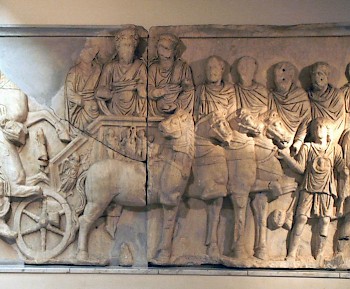
The story is probably untrue, as Dio almost admits when he says that he learned about it after Plautianus was dead, and maligning him was common. Yet, it illustrates the great hatred that the praetorian prefect must have caused among senators like Dio. And indeed, he must have been everywhere, and continued to persecute people whom he deemed to be enemies of the emperor. This had, since the reign of Tiberius, been one of the tasks of the praetorian prefect, although technically, only charges of lese majesty and high treason were taken into account. The papyrus known as P. Columbia 123 shows that "Fluvius Plaudianus" also investigated accusations against common officials. Later, this was standard practice: in the third century, the praetorian prefect took charge of all appeals against provincial governors.